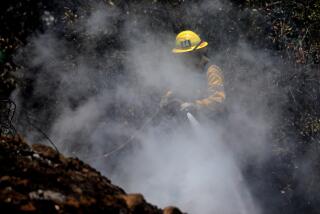TUSTIN : Police Happy With New Work Schedule
More than 60% of police patrol officers said in a city survey that a new work schedule that requires them to work fewer days but longer shifts has enabled them to be more productive.
“I come to work more motivated,” said Officer Dana Harper, an eight-year veteran. “With that motivation comes more productivity. I feel I do a better job.”
Police Chief W. Douglas Franks said the survey was conducted in July to assess how patrol officers are coping with their 12 1/2-hour shifts, three days a week. Forty-six of the 51 officers in the Patrol Division participated in the survey, Franks said.
Other Police Department employees, including police officers not assigned to patrol, work either five days with eight-hour shifts or four days with 10-hour shifts. Police dispatchers work under the 12 1/2-hour, three-day schedule, he said.
Franks said the new schedule was adopted in February after studies showed that longer shifts result in more police officers on the streets during critical periods of the day.
As many as 17 patrol cars could be on duty at any given time, Franks said. This was not possible under the old five-day, eight-hour schedule without the city spending a lot on overtime pay, he said.
The city has 23 patrol cars, three canine units and seven motorcycles in the patrol division, Franks said.
In addition to cutting overtime expenses, Franks said that under the new schedule, patrol officers spend more time with their families, boosting morale.
In the survey, 70% of the patrol officers said the new schedule minimized boredom. About the same percentage said it has given them more time to spend with the family.
“We’re able to save on child-care costs,” said Harper, 31, who has a 1-year-old son and a 5-year-old-daughter. His wife, Christian, works in a medical company, he said.
Officer Joseph Stickles, a 14-year-veteran, said fatigue is not a factor because officers have three days to rest.
Franks said there was a concern that officers would seek second jobs because they now have time on their hands. It has not happened, he said.
“It’s the most cost-effective shift available while satisfying the lifestyle needs of our personnel,” Franks said.
More to Read
Sign up for Essential California
The most important California stories and recommendations in your inbox every morning.
You may occasionally receive promotional content from the Los Angeles Times.










